

Culturally Intact: Anthropologist Douglas Raybeck. By Mark Daly Decked in his black baseball cap with the word “Posse” written across the front, a reference to his favorite nonprofit organization that helps public high school students get into college, Professor Douglas Raybeck stood at the front of the lecture hall in Thompson Hall at the University of Massachusetts Amherst on a recent Tuesday morning.

Raybeck, who is 6-foot-4, with a white beard and large circular glasses and known for rewarding students with quarters when they answer difficult questions, looked up at more than 100 students. It was an overbearing sight, he later said, as this was the first time he had ever taught a class so large. As the clock above his right shoulder struck 9:30 a.m., he began to count down, a signal that class was beginning. “Five. This is the way each class begins for Anthropology 104 students. An example of something he has observed, Raybeck said, “It is often the case that those who come in late are not well prepared.” Domestic Surveillance in Canada: Suspicious Incident Reporting. From AJP member Craig Proulx: I am wondering if this tattletale site will be used against Aboriginal peoples in Canada.
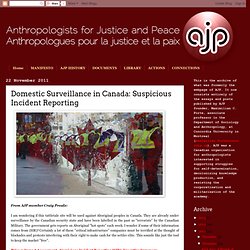
They are already under surveillance by the Canadian security state and have been labelled in the past as "terrorists" by the Canadian Military. The government gets reports on Aboriginal "hot spots" each week. I wonder if some of their information comes from (SIR)? Certainly a lot of these "critical infrastructure" companies must be terrified at the thought of blockades and protests interfering with their right to make cash for the settler elite. Privacy Impact Assessment - Suspicious Incident Reporting (SIR): Executive The RCMP works in partnership with domestic and foreign agencies to strengthen prevention measures against the threat of terrorism in North America and elsewhere.
Within this mandate, the RCMP is a national partner in protecting Canada’s critical infrastructure (CI). Data matching and profiling will not occur within the SIR System. Academia.edu - Share research. Surveillance, Dissent, and Imperialism. The Inner-Outer Dialectic of US Imperialism There are many ways that imperial expansion abroad can tie in with the socio-economic conditions and political relations that primarily pertain to the domestic sector of the imperial state.
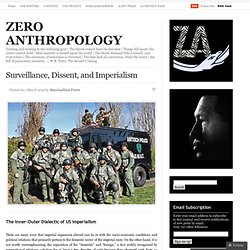
On the other hand, it is not worth overemphasizing the separation of the “domestic” and “foreign,” a fact widely recognized by international relations scholars for at least a few decades, if only because they observed such facts as foreign trade policy being conditioned by domestic production and consumption, as well as the growing regulation of domestic political and judicial structures thanks to a state’s participation in various international treaties and conventions. “International law” itself is an ambiguous entity for this reason, given that states’ ratification of international covenants usually means that those covenants acquire the force of law, domestically, and join if not supersede a national body of laws.
NUSA and GUSA References Democracy Now! Security — Cultural Anthropology. From terrorism to swine flu, to the current economic crisis, issues of security, broadly defined and experienced, seem to be taking front and centre stage in our contemporary moment.
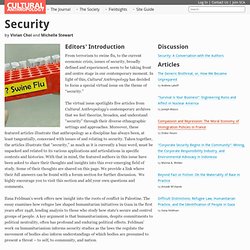
In light of this, Cultural Anthropology has decided to focus a special virtual issue on the theme of “security.” The virtual issue spotlights five articles from Cultural Anthropology’s contemporary archives that we feel theorize, broaden, and understand “security” through their diverse ethnographic settings and approaches. Moreover, these featured articles illustrate that anthropology as a discipline has always been, at least tangentially, concerned with issues of and relating to security. Taken together, the articles illustrate that “security,” as much as it is currently a buzz word, must be unpacked and related to its various applications and articulations in specific contexts and histories. Ilana Feldman’s work offers new insight into the roots of conflict in Palestine.
The Spy in the Cab: The Use and Abuse of Taxicab Cameras in San Francisco. Abstract Since security cameras were first required in San Francisco taxicabs in 2003, their unfolding story has come to contain many elements familiar to surveillance studies: the initial introduction of new technology in the wake of a moral panic; a failure of maintenance and a lapse into unreliability; and finally a resurgence accompanied by surveillance creep.
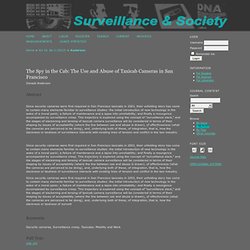
Intersection of Anthropology & Intelligence Community. Since the early 1990s I have been researching historical and contemporary interactions between American anthropologists and military and intelligence agencies.
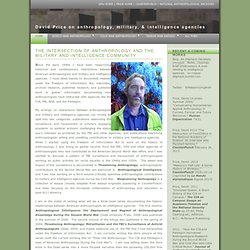
I have relied heavily on documents released under the Freedom of Information Act, interviews, archival research, published research, and published work to gather information documenting how anthropologists have interacted with agencies like the CIA, FBI, NSA, and the Pentagon. My writings on interactions between anthropologists and military and intelligence agencies can mostly be split into two categories: publications examining the surveillance and harassment of scholars engaging academic or political activism challenging the status quo's interests as protected by the FBI and other agencies, and publications examining anthropologists' willing and unwitting contributions to military and intelligence agencies.
At the top of this page are links to pages listing my published works. The Second World War. Architecture and Anthropology Curiosity Collaborative. Architecture and Anthropology Curiosity Collaborative. Surveillance has a long history in architecture and society.
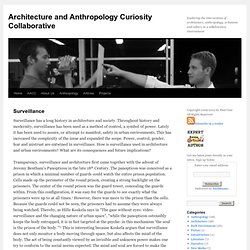
Throughout history and modernity, surveillance has been used as a method of control, a symbol of power. Lately it has been used to assure, or attempt to manifest, safety in urban environments.